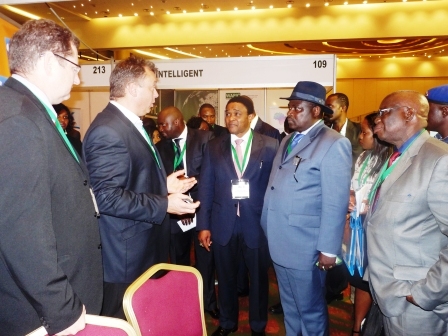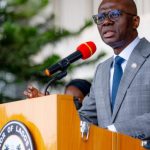There is money in FG’s Account For us To Participate In Electricity Trading – NBET Boss
Featured, Interview, Latest Headlines Wednesday, November 27th, 2013
Mr. Rumundaka Wonodi, is the Managing Director of the Nigerian Bulk Electricity Trading Plc. He told KAYODE ADELOWOKAN, in this interview about the readiness of the commission to begin transitional electricity market whenever it start and some of the progress that has come into the country’s power sector after it privatization. Excerpt;
Has there been provision for the $750 million dollar needed for the Nigerian Bulk Electricity Trading Plc to participate fully in the electricity trading?
Let’s look at how the money is coming, it is coming from N50 billion (fifty billion naira) of the privatization produce from the Egbin power sale is being kept for bulk traders. There is also euro bond, $350million dollars and budgetary receipt.
All the money as we speak is within the government covers and is all cash. Until we get into the transitional electricity market, all the money will still remain there until we begin active trading and to a large extent, it is suppose to provide comfort to generation companies. Though the money is not first source of payment to generation companies rather, we expect the distribution companies will pay fully for the power supplied to them then we can pay the generation companies.
Have there be any transaction between the Nigerian Bulk Electricity Trading Plc, generation companies or discos and if there is any, what is involved monetarily?
Monetarily, none rather, we have an agreement we entered with the generation and distribution companies but our frozen is waiting for transitional electricity market. We’ve developed agreement but there is no live transaction for now.
So, the money you aforementioned is still lying waste in your vault?
It is still with government agency, Central Bank of Nigeria (CBN) and the account of BPE.
What is transitional electricity market all about?
It is an electricity market where the relationship is through bi-lateral contract and the bulk traders sit in the middle of the contract between the generation companies and distribution companies. And until we start, most of the agreement signed will still be waiting. Basically what it does is to ensure that people have obligations; that is, companies that generate power do that regularly, those who distribute do that as at when due and consumers make payment of the services provided. One the challenge facing this industry is when people perform on ‘based endeavour basis’ and therefore, it is not enforceable contract. We expect that with the private sector also, the regulator can be much more efficient and effective in regulating the market.”
Therefore, the transitional electricity market is about a market where you have contract that are enforceable and would be market whereby people can participate.
Is it not starting late now?
There is no time that it start that would not be considered as late but the important thing is that you want to make a condition precedent that would put in place things that would ensure that when the market start, it is viable, last long and does not collapse. Some of these things take a little time longer and these are not things that anybody have done before, we do them, implement and we are learning but I think this is still the better time for it.
What are the conditions that must be put in place because you have already concluded the privatization process?
The thing about power which is very different from other commodities is that, it cannot be stored. The only way you can know that power is being utilized is if you measure it. Therefore, at the wholesale level i.e. transmission and retail, especially transmission, it is important you have adequate metering so that you can know how much a distribution company is consuming at any point in time. It is also important you put systems in place that will allow the operators to monitor that grades so that when he sits in Osogbo or Abuja where you have the control centre, from there, you can actually cut-off power to a distribution company that is consuming more than it should.
So, for monitoring, marketing and metering, you need to put those things in place and test them, though some of them are in place and need to test them then we start. Those are market conditions. Also, you need to have market panels in place, the panel that will advice the commission e.g. stakeholders advisory panel, metering panel, distribution panel etc. all those panels have been constituted even dispute panel but the issues with technology and testing are the only key things that are standing.
So, it is when the distribution companies are unable to pay that the bulk trader will step in?
It is when the distribution companies are unable to….the key thing is that, they will pay us and we will pay. We are always paying; the only thing is that when they are unable to pay for one reason that is when we fall back to our capitalization to make sure that we make the payment. So, every month the distribution company pay us 100 per cent, we pay it and when they pay 90 per cent, we take 10 per cent to add to it to pay 100 per cent and owe them. At no point would they be free of whatever they are owing us because the essence of our capitalization is to help when there is a small inch but not to be used as a subsidy for the market.
Related Posts
Short URL: https://www.africanexaminer.com/?p=5350






















